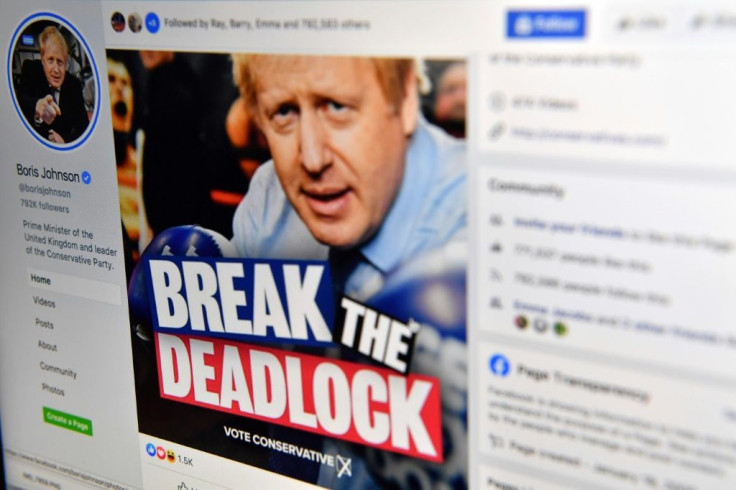Tories Lead UK Election Polls, But Brexit Not Guaranteed To Happen

British Prime Minister Boris Johnson held a double-digit lead in electoral polls ahead of Thursday’s general election, which could potentially see the United Kingdom leaving the European Union.
A poll by Britain Elects during the weekend indicated Conservatives leading Labour with 42% of the votes versus 32%.
But the Conservatives' lead has been narrowing in recent weeks, which has Johnson worried.
“We are fighting for every vote,” he said. “I think that this is a critical moment for this country.”
In the event Johnson’s Conservative Party wins the election and gains enough votes to form a majority in the 650-seat Parliament, the world may finally witness Brexit on Jan. 31 of next year. Subsequently, Johnson would be tasked with negotiating a new trade deal with the EU without being a member of the bloc.
However, if Jeremy Corbyn’s Labour Party wins the election, the fate of Brexit becomes muddier – Labour would likely call for another referendum, adding to more uncertainty regarding Britain’s relationship with its European trading partners.
The Guardian reported that if Johnson wins the election, but Tories fail to win a majority in Parliament, Johnson will have to form a minority government – and it will be difficult for him to find any allies to form a coalition. This would stall Brexit and keep Britain in the EU until at least a new referendum is called.
“The biggest thing we need to get right is Brexit,” Johnson said on Sunday. “That is the thing that has been hanging over us the last three years.” Johnson has also vowed to spend more public funds on healthcare and hiring more police.
The Brexit package also includes a plan to curtail immigration into Britain, one of the biggest issues in this election.
“Brexit is the most radical and profound change to the management of this country,” Johnson told Sky TV. “Brexit is indispensable -- you can’t move forward without Brexit.”
Meanwhile, Corbyn has promised a radical overhaul of the British economy, including nationalization of water and energy utilities, spending hundreds of billions of dollars on various projects and even the granting free internet to all Britons.
Corbyn also seeks to establish a 32-hour work week, reinvigorate labor unions and freeze the retirement age at 66. In addition, Labour wants to impose large tax increases on corporations and on the country’s top 5% of earners.
Among other measures proposed by Labour: pay hikes for public sector workers, the elimination of university tuition fees, and construction of more schools and hospitals.
All told, to fund these efforts, Labour will have to borrow about $72.4 billion annually by fiscal 2023.
"It's clearly a blueprint for a long term, fundamental change of the role, size, scale and scope of the state in the U.K.," Paul Johnson, director of the Institute for Fiscal Studies, an independent research institute, said of Labour’s proposals.
Businesses are highly concerned by Corbyn’s tax and spending manifesto.
"Labour's default instinct for state control will drag our economy down, rather than lift people up," said Carolyn Fairbairn, director general of the Confederation of British Industry, a lobbying group.
Corbyn has also claimed Johnson plans to sell off the popular National Health Service to U.S. companies following Brexit – Johnson has denied this allegation.
But Labour itself has a serious problem with one of its historically loyal constituents: British Jews are alarmed by rising incidences of anti-Semitism among Labour politicians.
Ephraim Mirvis, Britain's chief rabbi, has condemned Labour for its inadequate response to anti-Semitism and said the "very soul of our nation is at stake" in The Times newspaper.
In April, the Jewish Labour Movement, an affiliate of Labour Party, determined that Corbyn is unfit to be prime minister. The Jewish Labour Movement said it was aware of 130 outstanding anti-Semitism complaints against Labour members.
Corbyn has long advocated for Palestinian rights and has met personally with representatives of Hamas and Hezbollah, two groups classified as terrorist organization by most western governments.
“Many Jewish people have left the [Labour] party; that they feel it’s not a safe space,” said Mike Katz, the national chairman of the Jewish Labour Movement. “People want to excuse it by saying these are small numbers, but what happened to the principle that one racist is one too many?”
Corbyn has repeatedly denied he is an anti-Semite and asserted that if he wins the election he will protect all of Britain’s ethnic communities.
However, a poll taken in October for the Jewish Chronicle newspaper revealed that only 7% of Jews surveyed would vote for Labour. A March poll in the same paper found that 87% of respondents say Corbyn is anti-Semitic.
© Copyright IBTimes 2024. All rights reserved.





















